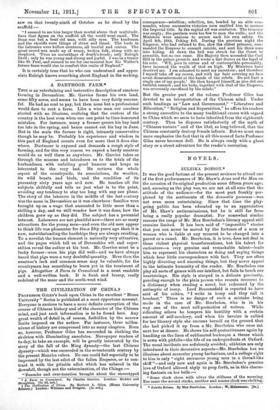THE CIVILIZATION 01' CHINA.f PROFESSOR GILES'S book upon China in
the excellent " Home University" Series is published at a most opportune moment. Everyone is anxious to have a more definite conception of the course of Chinese history and of the character of the Chinese mind, and just such information is to be found here. Any great wealth of detail is, of course, forbidden by the narrow limits imposed on the author. For instance, three millen- niums of history are compressed into as many chapters. Even so, however, Professor Giles has succeeded in clothing the skeleton with illuminating anecdotes. Newspaper readers of to-day, to take an example, will be greatly interested by the story of the fall of the Ming dynasty—the last Chinese dynasty—which was succeeded in the seventeenth century by the present Manchu rulers. No one could fail especially to be impressed by the last edict of the fallen Emperor, or to con- trast it with the pitiable edict which has ushered in the downfall, though not the extermination, of the Chings :—
" Eunuchs and over-taxation brought about the stereotyped • A Farm in Creamland. By Charles Garvice. London: Hodder and Stoughton. [7s. 6d. net.] t rare Civilization of China. By Herbert A. Giles. (Home University
Library.) London: Williams and Norgate. net.]
consequence—rebellion; rebellion, too, headed by an able com- mander, whose successive victories soon enabled him to assume the Imperial title. In the capital all was confusion. Tho treasury was empty; the garrison were too few to man the walls ; and the Ministers were anxious to secure each his own safety. On April 9th, 1644, Peking fell. During the previous night the Emperor, who had refused to flee, slew the eldest princess, com- manded the Empress to commit suicide, and sent his three sons into hiding. At dawn the bell was struck for the Court to assemble, but no one came. His Majesty then ascended the Coal Hill in the palace grounds and wrote a last decree on the lapel of his robe. WE, poor in virtue and of contemptible personality, have incurred the wrath of God on high. My Ministers have deceived me. I am ashamed to meet my ancestors ; and therefore I myself take off my crown, and with my hair covering my face await dismemberment at the hands of the rebels. Do not hurt a single one of my people.' He then hanged himself, as also did one faithful eunuch ; and his body, together with that of the Empress, was reverently encomned by the rebels."
But the greater part of the volume Professor Giles has devoted to an interpretation of the Chinese mind. Under such headings as "Law and Government," "Literature and Education," " Religion and Superstition," he offers his readers a strong corrective to the many traditional errors with regard to China which we seem to have inherited from the eighteenth century. Thus he disposes satisfactorily of the myth of " Chinese torture " and of the libel, so long believed, that the Chinese constantly destroy female infants. But we must once more emphasize the fact that in all this mass of facts Professor Giles never becomes dull. He is always ready with a ghost story or a street adventure for the reader's recreation.


















































 Previous page
Previous page